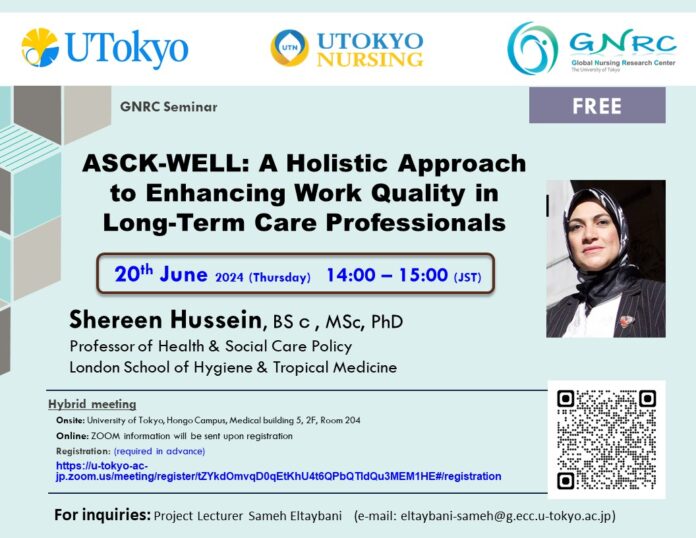On June 20, 2024, the Global Nursing Research Center (GNRC), University of Tokyo, hosted a seminar featuring Professor Shereen Hussein from the London School of Hygiene and Tropical Medicine, UK. The seminar focused on a critical aspect of healthcare: enhancing the work quality of long-term care professionals. This event, attended by 41 participants both virtually and onsite, highlighted the importance of developing robust measurement tools to assess and improve the work-related quality of life for those in adult social care.
Prof. Hussein’s Pioneering Work on ASCK-WELL
During the seminar, Professor Hussein presented her groundbreaking work on the Adult Social Care Work-Related Quality of Life (ASCK-WELL) instrument. This tool is designed to assess various facets of long-term care professionals’ working conditions and overall well-being. Professor Hussein emphasised the need for psychometrically robust measurement tools that are reliable, valid, practical, and easy to implement in real-world settings.
Importance for the Middle East and North Africa (MENA) Region
The insights from this seminar are particularly relevant to the Middle East and North Africa (MENA) region, where the demand for long-term care services is growing due to demographic changes such as ageing populations and increasing life expectancy. Developing a robust long-term care market in the MENA region presents challenges and opportunities. Ensuring the well-being of care professionals is crucial for the sustainability and effectiveness of these markets.
Benefits of Enhancing Work Quality in Long-Term Care
- Improved Care Quality: When care professionals are satisfied and well-supported in their roles, the quality of care they provide improves. This leads to better outcomes for service users and a higher standard of care across the board.
- Increased Retention and Reduced Turnover: High levels of job satisfaction and a positive work environment contribute to lower turnover rates among long-term care staff. This stability is essential for building experienced and skilled care teams.
- Economic Growth: By investing in the well-being of long-term care workers, the region can foster a more robust and resilient healthcare sector. This, in turn, supports economic growth by creating stable jobs and attracting investment into the healthcare infrastructure.
- Enhanced Social Stability: Quality long-term care services contribute to the overall social well-being of communities. By supporting the elderly and those in need of care, societies can maintain stronger family structures and social cohesion.
Practical Implementation in the MENA Region
The practical implementation of measurement tools like ASCK-WELL can help identify areas where improvements are needed and track the impact of interventions aimed at enhancing work quality. Policymakers and healthcare providers in the MENA region can leverage these insights to develop targeted strategies that address the specific needs and challenges faced by long-term care professionals.
Conclusion
The GNRC seminar with Professor Shereen Hussein underscored the importance of enhancing the work-related quality of life for long-term care professionals. For the MENA region, adopting such innovative tools and approaches can significantly benefit the development of long-term care markets, leading to better care outcomes, economic growth, and social stability. As the region continues to evolve its healthcare services, ensuring the well-being of care professionals will be a pivotal factor in achieving sustainable and high-quality long-term care systems.
Founder and Director
Shereen Husseinis a Health and Social Care Policy professor at the London School of Hygiene and Tropical Medicine (LSHTM), United Kingdom.
Shereen Founded the MENARAH Network in 2019, through an initial grant from the Global Challenge Research Fund, UKRI. She is a medical demographer with expertise in ageing, family dynamics, migration and long-term care systems. Shereen regularly collaborates with the United Nations, the World Health Organisation and the World Bank in policy and research focused on ageing in the Middle East and North Africa Region.
Shereen received her undergraduate degree in statistics and a postgraduate degree in computer science at Cairo University. She completed an MSc in medical demography at the London School of Hygiene and a PhD in quantitative demography and population studies at the London School of Economics and Political Science, United Kingdom.






